House Speaker Dade Phelan, enemy of the far-right, faces toughest reelection yet
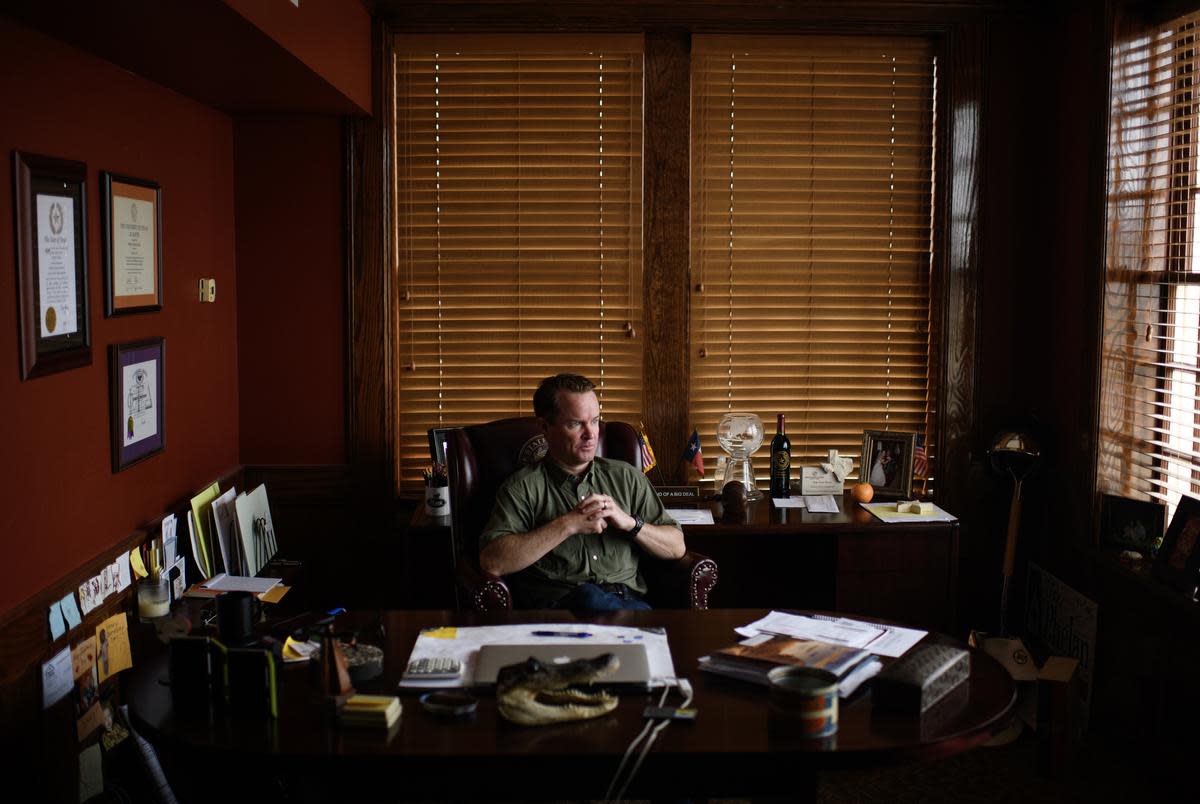
BEAUMONT — If past is prologue, Dade Phelan’s return to the Texas House would be all but guaranteed. Over five terms, he has never once drawn a reelection opponent, ascending to become the first House speaker from Beaumont, leading the lower chamber as it drifted further to the right.
But a tumultuous 2023 exposed deep fissures within the Republican Party, exacerbated by the House’s impeachment of Attorney General Ken Paxton and refusal to pass a school voucher program favored by Gov. Greg Abbott.
Now, Phelan is the No. 1 enemy of Texas’ far-right conservatives.
Paxton and his ally Donald Trump want Phelan ousted. So do the state’s lieutenant governor, agriculture commissioner, the chair of the state Republican Party and its executive committee. Abbott has declined to publicly back the speaker while campaigning against incumbent House Republicans Phelan is trying to protect.
The backlash has created an opening for two primary challengers — one of whom, David Covey, is well-funded — and placed Phelan in the most precarious position of his political career. The race has become a referendum on the influence of the most conservative faction of the party, which aims to make Phelan the first speaker to lose a primary in 52 years.
“Dade has lost his way, and is more beholden to the Democrats who elected him speaker than the people who elect him to fight for them,” said Paxton in an ad he cut for Covey.
Phelan doesn’t view the race as a yardstick to measure whether he or the attorney general is more influential in the state party. He sees his path to victory as reminding voters why he’s the best candidate to bring this often overlooked region the resources it needs to prosper in the future.
“I look at some of the folks who don't care for me; that's fine. They have their own motives,” Phelan said. “I have the support here in my district… none of that has changed. I have the support of my colleagues and that's what matters to me. I can’t focus on the outside noise.”
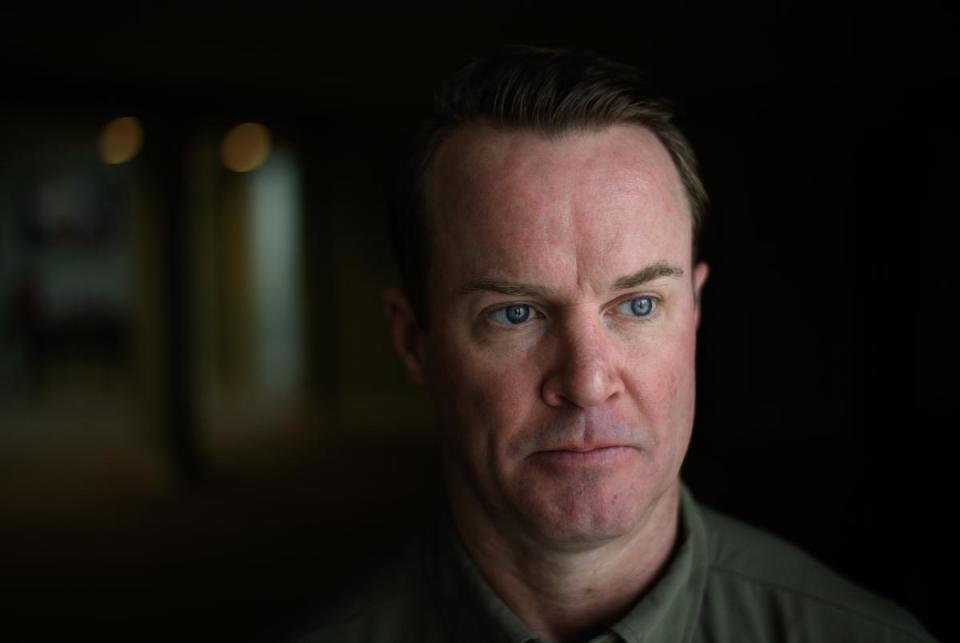
A son of Beaumont
District 21 hugs a corner of southeast Texas along the Louisiana border; it’s closer to Baton Rouge than Austin. Modern refineries line the Neches River near the Spindletop oil field, the site of the 1901 gusher that began the Texas oil boom. From there the district swings east to the shipyards and port in Orange, and then north, where Highway 96 slashes through the pine forests of rural Jasper County.
Residents cherish the easy living here along the Gulf of Mexico, the affordable homes and well-paying jobs at petrochemical plants. But the region is also ranked by the state as the most at-risk for natural disasters, and recently suffered devastating flooding from tropical storms Harvey and Imelda.
Phelan was first elected in 2014, when he trounced his Democratic opponent by 48 points. His family is among the most distinguished in Beaumont and its prominence, like the city’s, traces back to the oil field. His great-grandfather, John Henry Phelan, made a fortune at Spindletop and spent it on philanthropy and land; Dade Phelan works for the now fourth-generation real estate business.


In an interview at the company’s office in downtown Beaumont near Phelan Boulevard — a testament to the family’s legacy here — Phelan said he has spent his decade in office on issues that matter deeply to the district. He said he is proud to have secured investments for mental health, higher education and disaster preparedness, including a $1.7 billion bill for statewide flood protection that greatly benefited his district.
After the previous speaker imploded in scandal, Phelan ascended to the House’s top post in 2021 propelled by a reputation among Republicans and Democrats alike that he was an honest broker. In the first session he presided over, he and his leadership team shepherded the passage of conservative priorities that had previously been viewed as a bridge too far for many Republicans, including a near-total ban on abortion and permitless carry of handguns. Abbott touted it as the most conservative legislative session in recent memory.
Last year, with Republican voters citing border security as their top issue, the Phelan-led House approved $1.5 billion for walls and fencing along the Rio Grande and made illegally crossing the boundary a state crime.
His countenance betrays a tinge of exasperation that his commitment to his constituents and Republican principles is in question.
“I’ve answered the call, year in and year out,” Phelan said. “And not just on kitchen table issues that make Southeast Texas successful and growing, but on some of the most conservative bills that have ever passed the Legislature.”
Phelan retains the support of local establishment Republicans, including the Jefferson and Orange party chairs and Beaumont Mayor Roy West, and also is endorsed by former Gov. Rick Perry. Jefferson County Republican Party Chair Joe Evans praised Phelan’s commitment to protecting the oil and gas industry and funding local colleges like Lamar University.
“It may be once in a lifetime that you get a speaker of the House from your region,” Evans said. “It’s disappointing that people don’t acknowledge the large amount of resources that we have been privy to because he’s the speaker.”
Phelan’s standing among Republicans who consider themselves the party’s grassroots, however, is slipping.
Phelan began the 2023 legislative session batting away criticism from a small but vocal faction of Republicans who routinely nag him for appointing Democrats to committee leadership positions, which they feel is a slap in the face to voters who elected a conservative majority. It was easy enough to ignore, as Phelan still overwhelmingly had the confidence of his House membership.
But the real trouble came when the House voted to impeach Paxton, a fellow Republican, on charges of corruption and bribery. Phelan registered his support for impeachment, even though the speaker rarely casts votes unless they feel strongly on an issue.
Far-right conservatives were apoplectic, labeling Phelan and his allies traitors and RINOs (Republicans in name only). Paxton’s legal team seized on this strategy, casting his accusers as pawns of the Bush family, the erstwhile face of the Republican Party that has become a synonym among conservatives for unacceptable centrism.
When Paxton won acquittal in the Senate, Lt. Gov. Dan Patrick, who had just presided over the trial as judge, dropped his veil of impartiality to launch an attack into the House. The impeachment was flawed and a waste of taxpayer money, Patrick said. It was just his latest spat with Phelan, after the two spent weeks in a stalemate over which chambers’ version of a property tax relief bill to pass.
Another intraparty dispute widened in November when the House sank a school voucher bill, the governor’s top legislative priority and a longtime pet issue for Patrick. Months of talks proved useless when Abbott refused to accept a scaled-back bill House negotiators pitched. Phelan didn’t cast a vote on the amendment that ultimately killed the voucher program. But he was criticized by Patrick and other voucher advocates as not having done enough to help pass them.
The speaker told the Tribune he would have preferred a modest voucher bill to pass, but the political damage is done. Once an ally, Abbott appears indifferent to Phelan’s political survival — he has remained silent on this race — and is campaigning against anti-voucher Republican House incumbents, forcing Phelan to spend time and money protecting his members.
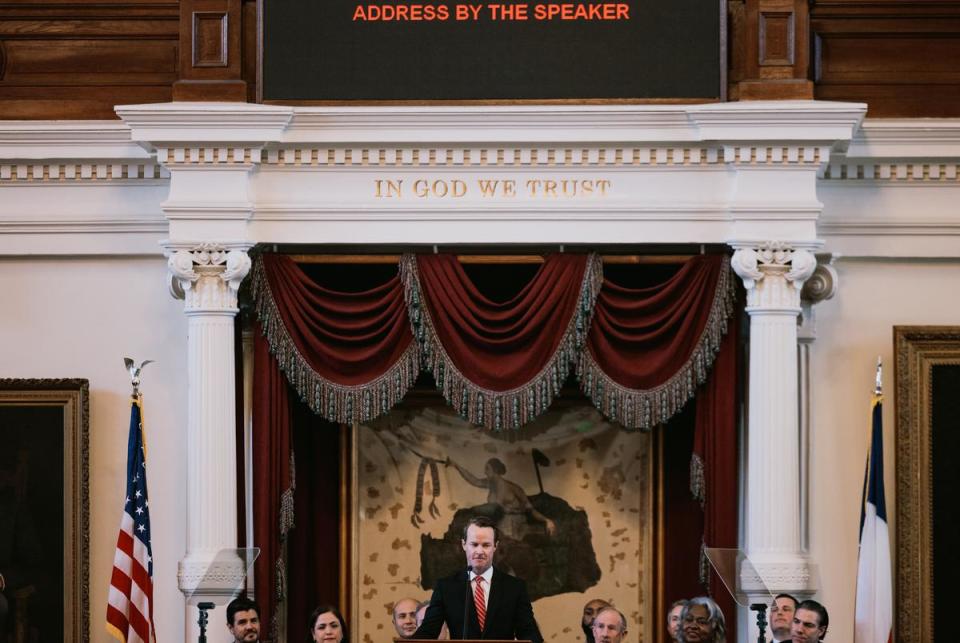
Phelan’s relationship with Patrick took another hit after the Tribune reported that the leader of a political action committee, Defend Texas Liberty, that had recently donated $3 million to the lieutenant governor met with prominent white supremacist Nick Fuentes. Phelan called on Patrick to donate the money to charity, and Patrick responded by demanding Phelan resign.
The feud between the House and Senate leaders has gotten so bad that Phelan said he and Patrick have not spoken since before the impeachment trial began in August. It’s on the lieutenant governor, he said, to mend the relationship. Meanwhile, Patrick cut an anti-Phelan video ad accusing the speaker of not being a true Trump supporter.
In a statement, Patrick declined to say how the pair would get along better. He accused Phelan of cowing to Democrats’ interests on issues like punishing voter fraud and bail reform.
“I do not fight against Dade, I fight for the people across Texas who elected me and I always will,” Patrick said. “It shouldn’t be this hard.”
By November, several county Republican parties, including Orange and Jasper in his district, had censured the speaker over his perceived failure to adhere to conservative orthodoxy by being accommodating to Democrats, tepid on border security and supporting the impeachment. The executive committee of the Texas Republican Party voted 58-2 for a resolution calling on Phelan to resign. In a December University of Texas Politics Project poll, more conservative voters said they disapproved of Phelan’s job performance than approved.
Regardless, Phelan said he has no regrets about impeaching Paxton, and he said that tolerating corruption may harm the long-term prospects of Republicans in Texas. He views Republican Sen. Drew Springer’s revelation last week that he was reconsidering his vote to acquit Paxton as vindication that the House was right. Those local groups who censured him, Phelan said, are “insider baseball party people” who will conjure any excuse to defend Paxton.
“We’ve knocked on thousands of doors, and I’m not hearing about [impeachment],” Phelan said. “It’s not at the forefront of voters’ minds.”
For months, Phelan opponents have bombarded voters in District 21 with attack ads via television, radio and mailers. There are signs they may be working.
Patricia Kemp, an Orange County Republican Party precinct chairwoman who voted to censure Phelan, acknowledged the speaker has done a lot for the district. But she believes Phelan cares more about power than following the Republican platform.
“Sometimes when you hold an office long, you start to think you’re invincible,” Kemp said, adding that she is leaning toward Covey because he would represent “new blood.”
Daniel Whitton, vice president of the Jasper County Republican Club, said the sheer volume of anti-Phelan messaging from his opponents, especially about the Paxton impeachment, threatens to drown out the facts.
“If you’re not listening to the speaker himself, then everything else tends to be pointed against him,” said Whitton, who is undecided in this race. “That’s an overwhelming amount of information if you’re trying to make up your own mind.”
Meanwhile, Phelan’s speakership is becoming a liability for his Republican allies on the campaign trail who are being quizzed during debates over whether they’d support him as the chamber leader, should he win.
Recently, Rep. Terry Wilson, one of Phelan’s committee chairs, waffled when asked at a January candidate forum if he’d reelect the speaker.
“If Dade Phelan is the most conservative and supported speaker to win that election in caucus… then I’m going to have to support him,” the Marble Falls Republican said at the conclusion of a meandering answer. “If it’s someone else, I’ll be supporting them.”

A well-funded challenger
Phelan’s opponents have coalesced around Covey, an oil and gas consultant and former chairman of the Orange County Republican Party.
Covey said he is well-positioned to represent the district’s economically and socially conservative values, citing his decades of involvement in Republican politics since he attended the party’s state convention as a child. In his view, Phelan is an out-of-touch Austin insider who abandoned his constituents to secure the speaker’s gavel. His rhetoric echoes Paxton’s attacks on Phelan.
“You have two sides of the Republican Party,” Covey said. “One is the Karl Rove-Bush line that Phelan is part of, and then one is the Trump-[Ted] Cruz line that says don’t compromise, stand for our principles, pass our priorities. Me and Speaker Phelan are in separate camps.”
Outflanking Phelan on the right is difficult, given the speaker’s conservative bona fides. Covey acknowledged that the House passed border security bills last year, but said it was too little, too late. Though he blasted Phelan’s support for Democratic committee chairs, he was unable to name a conservative priority that has failed in the chamber as a result. And he has pledged support to the fringe Texas secession movement.
Covey, Phelan believes, is an opportunist willing to do the bidding of Paxton and out-of-district donors who don’t like the speaker.
Covey denies that he is simply a pawn of the attorney general and far-right interests, though he announced his candidacy in June, when local Republican parties began censuring Phelan in the wake of the House’s impeachment vote in May. Paxton, who vowed revenge on the lawmakers who tried to oust him, campaigned for Covey at a rally in Beaumont in January.
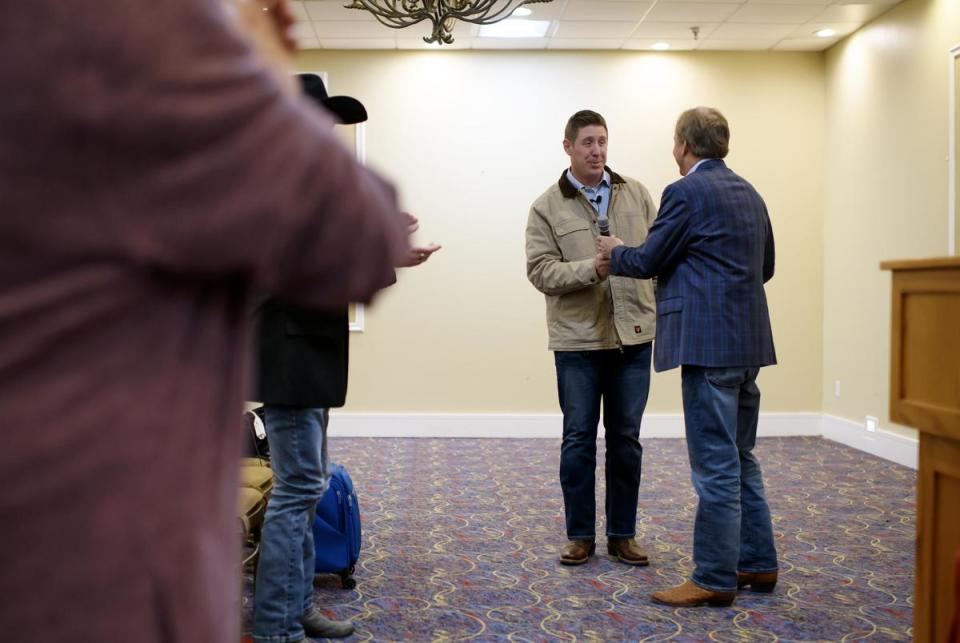
And half of the campaign contributions Covey has reported to date, by way of a single $50,000 check, have come from Defend Texas Liberty. The political group, mainly funded by Midland oilman Tim Dunn, often targets Republicans it deems insufficiently conservative and is a frequent foe of Phelan.
“My decision to run had nothing to do with impeachment,” Covey said. “Our support comes from people all over the district, with 300 individual donations.”
Covey fashions himself as the true grassroots candidate in the race, an unapologetic activist rather than an equivocating politician. He said he would keep abreast of constituents’ priorities by holding regular town hall meetings unlike Phelan, whom he said residents complain is inaccessible.
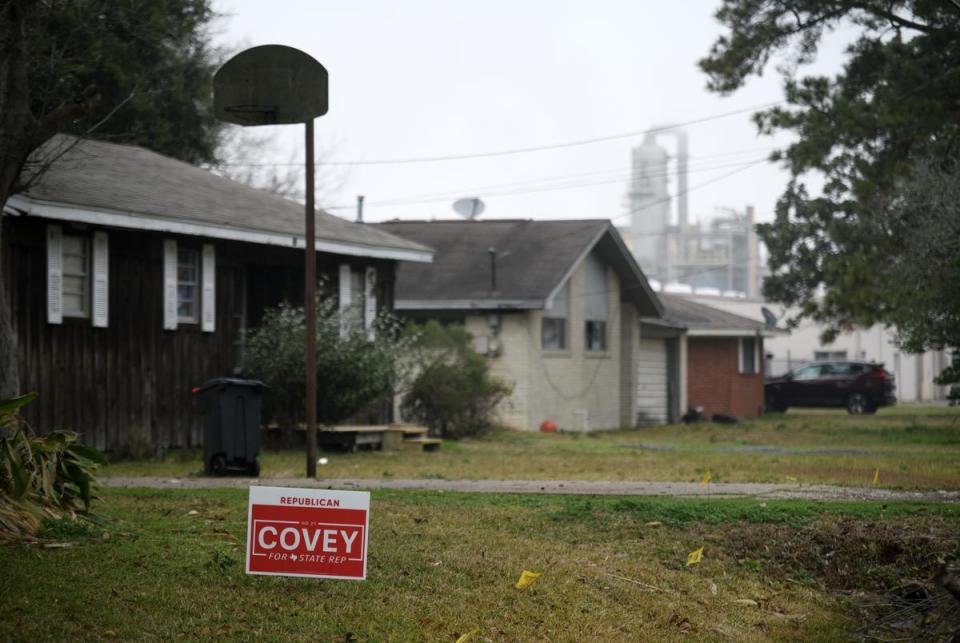
But claiming to be the voice of the party’s base is a tricky business. Some voters see Covey’s background as a party chairman as a sign he’s just like Phelan, a glad-handing politician willing to betray their values should they send him to Austin. Instead, they’re backing Alicia Davis, the third candidate in the race who has centered her campaign on eliminating property taxes.
A hairdresser with little fundraising or endorsements, Davis is unlikely to win. But securing even a fraction of votes increases the likelihood that Phelan fails to win 50 percent and is forced into a runoff. She spends her time driving her Jeep around the district meeting voters face-to-face.
Mike Hillin, an electrician in Jasper County, said he supports Davis because of her dedication to represent the interest of working Texans, noting she has helped homeowners protest their tax assessments, free of charge. Her lack of high-dollar donations, Hillin said, sets her apart as the real grassroots choice.
“I feel like David Covey has the potential, although he’s not a millionaire born with a silver spoon in his mouth like Dade Phelan, to be a go-along-to-get-along candidate,” Hillin said. “Don’t count Alicia out, because we’re hoping these grassroots folks come out of the woodwork because they are tired of politicians not giving them their due.”
Renzo Downey contributed reporting.
Disclosure: Lamar University has been a financial supporter of The Texas Tribune, a nonprofit, nonpartisan news organization that is funded in part by donations from members, foundations and corporate sponsors. Financial supporters play no role in the Tribune's journalism. Find a complete list of them here.
We can’t wait to welcome you to downtown Austin Sept. 5-7 for the 2024 Texas Tribune Festival! Join us at Texas’ breakout politics and policy event as we dig into the 2024 elections, state and national politics, the state of democracy, and so much more. When tickets go on sale this spring, Tribune members will save big. Donate to join or renew today.
Correction, Feb. 5, 2024 at 11:53 a.m. : Correction: A previous version of this story stated that all three county chairs had endorsed Phelan. Jefferson County Republican Party Chairman Johnny Gravis has not endorsed a candidate in the race.
